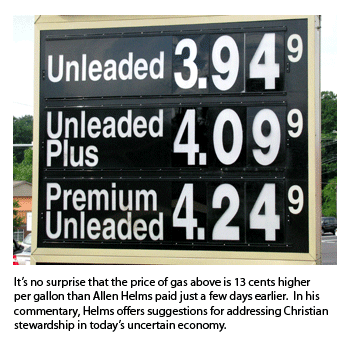By Allen Helms
I just filled my car’s gas tank at the price of $3.82 per gallon. By the time you read this, that price may seem like one from the “good old days” for where  you may be.
you may be.
Who knows how much higher the price of gas per gallon or barrel might go? What about the high number of home mortgage defaults and related foreclosure proceedings? And now we hear that food prices are likely to increase because of flood-ruined crops.
Where will it end? When will we get back to normal? And what’s normal for a dynamic economy anyway?
Higher prices will more than likely have an impact on what churchgoers place in offering plates.
So what should we be doing and saying to assist others with financial stewardship during these uncertain times?
Difficulties often present prime opportunities for teaching life lessons. It is no different with today’s economy and stewardship.
Yes, stewardship still matters in today’s uncertain economy. This is an opportune time to search the Scriptures with your members, and to discuss, teach, and preach about what it means to be a steward while living with the resources we have been given.
Rev. Wayne Knolhoff, director of stewardship with LCMS District and Congregational Services — Stewardship Ministry, says repeatedly that any teaching on the subject of stewardship must start with the steward and the fact that we are justified by God on account of Christ’s work, by grace, through faith.
As family and church budgets take up more of our discussions in the months ahead, I encourage you to begin those times of “wrestling” by reminding yourself that you are God’s steward by His grace.
Everything belongs to God and we are to responsibly manage those blessings of His that He has entrusted to us.
With those truths as a foundation, I would like to offer thoughts and suggestions that leaders might use as stewardship teaching points:
We need to understand what it means to be a steward before we talk about the practice of stewardship.
R. Scott Rodin defines a steward this way in his book Stewards in the Kingdom: “A steward is under the command of one who owns the resources to be stewarded. Stewards are by definition not owners, but they have a relationship with the owner in order to be a faithful steward.”
A Christian steward does not give out of what is left over at the end of the week or month, but gives proportionately from the income he or she is blessed to receive.
Rising prices affect what’s left, not what has been committed. Paul writes, “For they gave according to their means, as I can testify, and beyond their means …” (2 Cor. 8:3).
The Bible never suggests an amount, but always speaks of percentages — percentage of income.
A district models stewardship for the congregation by honoring its percentage commitment to the Synod, even when times get tough. The congregation models the same for its members by honoring its percentage mission commitment to the district. Leaders do the same thing with their offerings to the congregation.
This is a good time to educate members about percentage giving vs. committing a flat amount — if income goes up, the amount of contribution goes up; if income goes down, the contribution goes down.
By definition, to sacrifice is to give something up for the benefit of someone or something else. Sacrificial giving for the Christian steward is to give up earthly, temporary things when finances get tight — to honor our monetary commitment to Christ and His church.
Some of us may have to do without that extra night at the restaurant and the movies, or an extravagant vacation.
Just when Abraham was about to plunge the knife into Isaac’s chest, God stopped him with these words in Genesis 22: “Do not lay a hand on the boy, for I now know that you would not withhold anything from me, not even your only son.”
While our own sacrifices pale in comparison, the point is made in the following two questions: What’s in your heart? What are you willing to sacrifice in order to make your financial commitment to your Lord through your church a priority when money gets tight? We don’t want to give anything up, but sacrifice means just that!
The account of God and Abraham just mentioned models the perfect relationship that God wants with His people — a complete faith that He will provide all things. “Consider the birds …. consider the lilies … how much more will He clothe you?” (Matt. 6:26-30).
The Christian steward, in faith, can now address the financial stewardship question from a new perspective: It changes our line of questioning! No longer do we ask, “How much will we give to God?” Now we ask, “How much of what is God’s can we in good conscience use just for ourselves?”
Our members may suddenly find themselves struggling to make ends meet. Even so, now is not the time to shrink from the topic of stewardship. Instead, as you teach stewardship lessons during uncertain economic times, always do so in empathy and love, never in judgment or under compulsion. Remember, too, that not everyone is at the same place in their understanding. So our prayer for them should be that they will respond to these present challenges as God guides them.
Stewardship is about faith, not funds. God has given us what we have so that we might accomplish His purposes. In His wisdom, our Lord invites us to be a part of His mission so that our lives will have meaning and purpose. In tough economic times, it’s good to remember that.
Allen Helms is on the staff of the LCMS Mid-South District, as executive assistant to the district president for gift planning and finance. He is a member of Christ the King Lutheran Church in Memphis, Tenn.
Posted June 26, 2008



